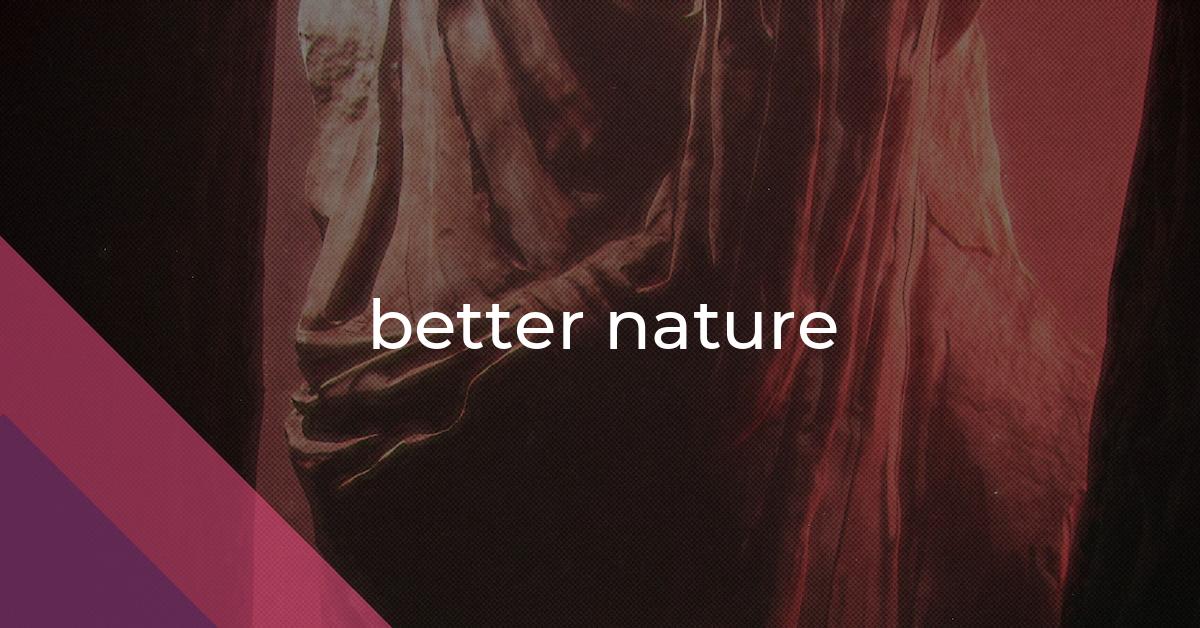better nature: Idiom Meaning and Origin
What does ‘better nature’ mean?
The idiom "better nature" refers to the inherent or fundamental goodness or kindness that exists within a person. It suggests that individuals have the capacity to act in a morally upright or compassionate manner.

Idiom Explorer
The idiom "nature of the beast" refers to the inherent qualities or characteristics of a particular situation or thing. It suggests that certain behaviors or outcomes are to be expected because they are essential to the very nature of that situation or thing.
The idiom "do the decent thing" means to act in a morally or socially acceptable way, often by making a fair or honorable choice. It is used to urge someone to do what is right or ethically appropriate.
The idiom "do right by" means to treat someone fairly or justly, to do what is morally or ethically correct toward them.
The idiom "deep down" refers to one's true or hidden feelings, thoughts, or qualities. It suggests that there is an inner core, often different from one's external appearance, that truly represents who a person is.
The idiom "creature comfort" refers to the basic or essential physical needs and comforts that are necessary for a person's well-being and contentment.
The idiom "come from a good place" means to have good intentions or to have genuine and sincere motives in one's actions or words.
The idiom "carry oneself" refers to how one behaves and presents themselves in a particular manner or situation.
The idiom "by virtue of" means because of or due to a particular quality, attribute, or circumstance.
The idiom "by rights" is used to express what should naturally or logically happen based on the situation or what is fair and expected according to the rules or norms.
The Power Within
"Better nature" is an idiom commonly used to describe a person's innate or inherently good qualities. It contrasts these positive qualities with negative or selfish tendencies that individuals may also possess. The idiom suggests that every person has the capacity to act in a kind, compassionate, or moral manner, and it encourages them to tap into this positive side of their character. It conveys the idea that individuals can choose to prioritize their better nature and make decisions that align with their more positive qualities.
The origin and historical background of the idiom "better nature" are unclear, as there are no specific sources that provide a definitive explanation. However, it can be inferred that the idiom is based on the concept that human beings have both good and evil tendencies within them. The "better nature" represents the inclination towards the positive aspects of a person's character, highlighting the belief in their innate goodness.
The usage of the idiom "better nature" is typically seen in contexts involving decision-making or moral choices. It often appears when individuals are encouraged to prioritize their kind, empathetic, or compassionate instincts over more self-serving or divisive motivations. For example, someone may be urged to "appeal to their better nature" when considering how to respond to a difficult situation or when persuading them to show understanding or forgiveness.
Although the idiom "better nature" emphasizes a person's inherent goodness, it also acknowledges that individuals may struggle with their baser instincts. It suggests that accessing and cultivating their better nature requires conscious effort and moral reflection. This implies that individuals have the ability to choose actions that align with their more positive qualities, contributing to a more harmonious and ethical society.
The idiom "better nature" can be interpreted and applied in various ways, depending on the context. It can be used to discuss individual behavior, interpersonal relationships, or societal issues. The specific meaning of the idiom may depend on the circumstances in which it is used and the intended message or call to action that accompanies it.
It is worth noting that the idiom "better nature" is related to other idioms such as "better angels," "nature of the beast," "be oneself," and "all heart." These idiomatic expressions share a common theme of emphasizing positive qualities, inherent goodness, or true character.
"Better angels" is an idiom that refers to the noble or higher qualities within individuals. It suggests that each person has the potential to act with kindness, empathy, and moral integrity, despite any negative influences or temptations they may face. This idiom is often used to inspire individuals or society as a whole to strive for their better angels and choose actions that promote harmony, understanding, and justice.
"Nature of the beast" is an idiom that acknowledges the inherent characteristics or qualities of something or someone. It is often used to describe certain traits or behaviors that are considered inherent in a particular situation or individual. In the context of "better nature," the idiom "nature of the beast" may highlight the presence of both positive and negative qualities within a person, with the emphasis on understanding and tapping into their better nature.
"Be oneself" is an idiom that encourages individuals to embrace their true character or nature. It emphasizes the importance of being authentic and genuine, rather than trying to conform to societal expectations or norms. In relation to "better nature," the idiom "be oneself" suggests that individuals should tap into their better nature and act in ways that are true to their inherent goodness and positive qualities.
"All heart" is an idiom that describes someone who is compassionate, caring, and empathetic. It refers to a person who consistently acts with kindness and understanding towards others. In the context of "better nature," the idiom "all heart" aligns with the concept of tapping into and nurturing one's better nature, choosing to act with compassion and empathy in all aspects of life.
To summarize, "better nature" is an idiom that highlights the belief in the presence of innate goodness within individuals. It encourages people to prioritize their positive qualities and make choices that reflect kindness, empathy, and moral integrity. The idiom is related to other idioms such as "better angels," "nature of the beast," "be oneself," and "all heart," which all share a common theme of emphasizing positive qualities, inherent goodness, or true character. These idioms remind us of the potential for personal growth and the power of each individual to make a positive impact in the world.
Example usage
Examples:
- He chose to ignore his better nature and made a selfish decision.
- Although he was tempted to seek revenge, he decided to listen to his better nature and forgive her.
- Even though it was difficult, she followed her better nature and decided to help the homeless man on the street.
More "Altruism" idioms
We missed the mark - nothing found.



